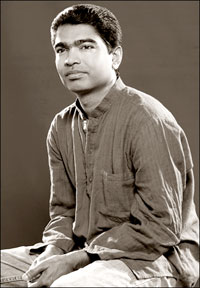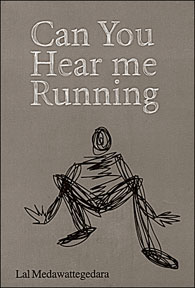Insight
into complexities of Sri Lankan life
Real Life Characters in fiction :
 Lal Madawattegedara touches on the lives of ordinary men and women in
Sri Lanka and his scope is not confined to typical upper middles class
life in the suburbs of Colombo. He is one of the few Sri Lankan writers
in English who could understand the heart beat of the nation. Lal Madawattegedara touches on the lives of ordinary men and women in
Sri Lanka and his scope is not confined to typical upper middles class
life in the suburbs of Colombo. He is one of the few Sri Lankan writers
in English who could understand the heart beat of the nation.
|

Lal Madawattegedara |
His short stories are peopled with battle hardened soldiers, chimney
sweepers, coffin makers and victims of Tsunami. At times, Lal’s stories
reflect on the middle class milieu scornfully criticizing false values.
One of the salient characteristics of his short stories is that they
are deeply rooted in distinct Sri Lankan reality. They are highly
absorbing and the language is simple and direct.
Beneath the satire lies potent and tear-jerking stories peopled by
ordinary folk of the land. It is the kind of literature that is emerging
in the Sri Lankan literary landscape as beacons of hope for new
generations yet to come. English from his pen reveals the experience of
the land in a way which is memorable and absorbing. His latest anthology
above all depicts that Lal knows his roots and does not forget them.
His stories speak themselves of morality and without any pedantic
penchant deal with complex social issues that are distinct to particular
class and in most unexpected contexts.
Q. As a journalist and writer, how do you see the latest
trends in the changing landscape of Sri Lankan writings in English?
 A. “The trends are positive. Lots of writers are active. Lots
of books are out there. It is pleasant to think of a larger writing
community out there trying hard to weave a literary landscape with their
plots. A. “The trends are positive. Lots of writers are active. Lots
of books are out there. It is pleasant to think of a larger writing
community out there trying hard to weave a literary landscape with their
plots.
Q. In your view, how do you consider often aired allegation
against Sri Lankan writings in English that its scope is confined to a
certain strata of society that is out of touch with the common man?
A. I do not consider allegations or criticism as negative.
Everyone has the right to express his or her opinions. But you must
understand that an opinion is uniquely individual. And at any given time
any opinion can be contested.. So if Sri Lankan writing in English is
“confined” let us a have a lively debate to find out what this
confinement is all about.
Q. In “Can you hear me running”; you have, perhaps, for the
first time ventured into the territories hitherto untouched by
contemporary Sri Lankan writers in English. For instance you have
criticized the false values of Sri Lankan middle class. How did you
gather the material for the stories, for instance, like “Sandals, Hero,
woman, Hair, Girlfriend and Ant?
A. I am not sure whether it is correct to say that “can you
hear me running” is first timer that ventures into subjects untouched.
Yes, I do crticise false values. The stories you mentioned came from the
society itself.
Q. In the title story “Can you hear me running “, you have
brilliantly portrayed the psychosis of a battle-hardened soldier and the
language used in, is rich with metaphor appropriate to Sri Lanka.
A. Thanks very much. This story also won the first place at
the English Writers’ Cooperative annual short story competition 2006.
Yes, my intention was to portray the human cost of war.
Q. In your view, do you think that Sri Lankan writers in
English have given enough space to highlight the plight of men and women
who were and are caught up in a protracted conflict?
A. Yes. I think not only Sri Lankan writers, but song writers
and film script writers are trying hard to capture the human being
caught in the protracted conflict.
Q. In ‘The Grass Cutter’s Caricature’, you have shown a sharp
insight into the relationships between different social strat and the
plight of the grass cutter.
A. Yes, at the same time this story also shows that humility
can be found in the most unusual places.
Q. How do you perceive the relationships between different
social strat in Sri Lanka and the plight of the ordinary folk of the
land?
A. The relationship is very complex and at times confusing.
But it is like any such society anywhere is the world.
Q. ‘Tears of a Coffin Maker’ is a tribute to the thousands who
lost their lives in Tsunami. Though a considerable number of stories
have been penned on Tsunami, some of the stories I find not as touching
as ‘Tears of a Coffin Maker’. What are your views on stories written on
Tsunami in general and those which were written in English particular?
A. Thanks very much. This particular short story looks at
Tsunami from the view point of a hard-hearted prisoner. There are other
Tsunami related stories or stories whose backdrop is Tsunami by Ashok
Ferry, Simon Harris, Neluka De Silva and late Nihal DE Silva plus many
others. They all look at Tsunami from different perspectives. That’s
what I like about them. The perspectives, because the impact of the wave
continue to live in those perspectives.
Q. “Tarred Memories” is a story which criticizes counter
insurgency strategy tailored by UNP regime in cracking down the
insurgency. Do you think that Sri Lankan writers in English sufficiently
portrayed that dark era in their writings or they continue to write on
day-today experiences?
A. More than the English writers it is the Sinhala writers who
wrote some heart breaking stuff about the 1989 youth resurrection.
Q. “Appreciations” you have lashed out on the culture of
appreciating the dears-departed extolling the virtues that really did
not posses in life. How do you perceive Sri Lankan traditions associated
with Buddhism and Christianity and people’s attitude that death is a
estrange phenomena?
A.I think regardless of the religion death is still a stranger to our
civilization.
Literature from both the East and the West also demonstrates how we
extol virtues of people after death. So I think this issue is universal.
Q. “Last war” is perhaps, the best which describe the plight
of the innocent citizens who were blown into pieces as a result of bomb
explosions.
The deafening silence maintained by writers, so called human right
crusaders with regard to victims of bomb explosions is estrange and
seriously questions their genuinely.
A. A human being blowing him/herself up is not a pleasant
thing at any given time. I do not think that any civilized human being
will appreciate such acts.
Q. Do you think that Sri Lankan writers in English should take
up a strong stance against such attacks on civilians launched in the
name of liberation?
A. I don’t believe that writers should take a stance. A writer
should portray the reality as much as possible.
Q. What are your views on the Gratiaen Prize in general and
the selection criteria adapted by the panel at the recently concluded
Gratiaen award ceremony which apparently had a bias towards poetry?
A. I do not think there was any bias. In the opinion of the
judges the poets did well. |
